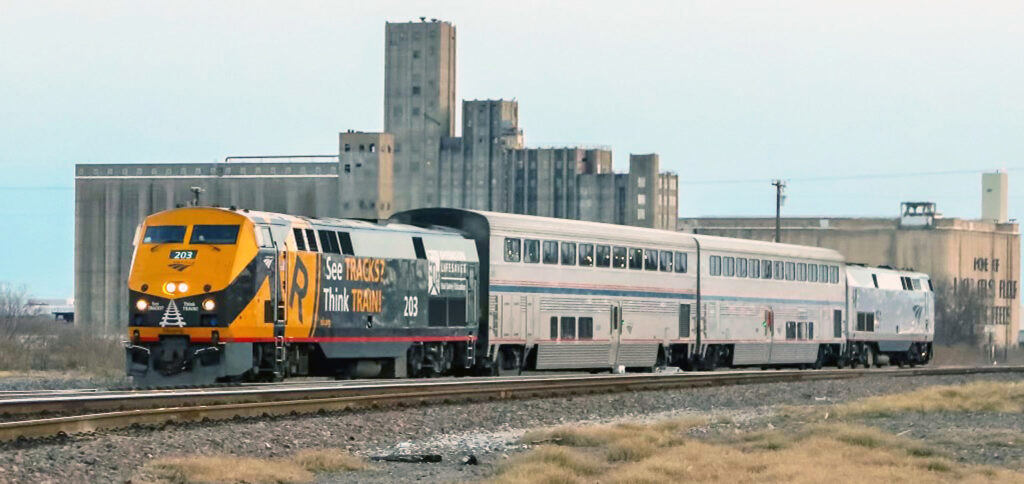All about the community of model railroading and rail enthusiasm
April 16, 2025
Passenger rail in Texas is finding itself under the microscope as public funding dries up.
U.S. Department of Transportation Secretary Sean P. Duffy announced Monday that the Federal Railroad Administration and Amtrak agreed to terminate the $63.9 million grant awarded for the Amtrak Texas High-Speed Rail Corridor previously known as the Texas Central Railway project. In a separate development, a top Texas transportation official warned that the state-supported Amtrak Heartland-Flyer could shut down as early as June because of lack of funding.

The high-speed project was originally announced as a private venture through the Corridor Identification and Development Program for Amtrak, but cost estimates dramatically ballooned and the proposal became dependent on Amtrak and federal dollars for development work.
The project cost is now believed to exceed $40 billion – making construction unrealistic and a risky venture for the taxpayer, Duffy said.
“I am pleased to announce that FRA and Amtrak are in agreement that underwriting this project is a waste of taxpayer funds and a distraction from Amtrak’s core mission of improving its existing subpar services,” Duffy said. “If the private sector believes this project is feasible, they should carry the pre-construction work forward, rather than relying on Amtrak and the American taxpayer to bail them out. My department will continue to look for every opportunity to save federal dollars and prioritize efficiencies.”
FRA chief counsel Kyle Fields said the announcement “reflects a recognition by Amtrak and FRA that federalizing the Texas Central Railway proposal is not the best use of taxpayer funding.”
Texas Rail Advocates, a big proponent of Texas high-speed rail, reported that House Transportation Committee chairman Tom Craddick announced that all bills to be heard in the Thursday morning, April 17, session were removed to make way for testimony from Texas Central, an unusual move for legislators to deal with this sort of issue so quickly.
Fort Worth businessman John Kleinheinz has emerged as the lead investor for the Texas Central project. Earlier this month, the company announced at a transportation hearing that Kleinheinz, who has backed the project for some time, had bought out Japanese financial interests but would still use Japanese technology in running high-speed trains.
Kleinheinz is president and CEO of Kleinheinz Capital Partners, founded in 1996, and also serves as investment advisor to the Global Undervalued Securities Fund.
Texas Rail Advocates president Peter LeCody, who went to the Texas Capitol on the day Duffy made the announcement, said House Transportation committee members were not pleased with responses from a Texas Central spokesperson at an April 3 hearing and issued a subpoena for the private firm to appear with company documents at a future date, which has been pushed to Thursday.
“Is this going to be a seismic shift from first being driven by private efforts, then shifting to Amtrak in the public sector when the project stumbled during the pandemic, and now back to private hands to make this a reality?” LeCody asked.
FRA said its interest in new rail projects isn’t ending with the withdrawal from the Texas Central Project. FRA will reallocate the approximately $60 million balance from the termination of this CID program grant to other projects that support what it calls safe, efficient and reliable rail transportation.
Meanwhile, North Texas is on the cusp of losing the only daily train that serves Fort Worth, Gainesville and Oklahoma because the yearly funding for the train was stripped out of the Texas legislative budget.
The Heartland Flyer, in operation since 1999, carried over 80,000 passengers last year and could be discontinued as early as June due to lack of funding, Texas Rail Advocates reported.
The train, a partnered service between the Texas and Oklahoma departments of transportation and operated by Amtrak crews, has historically faced elimination, sometimes getting a last-minute reprieve. Local and regional elected and appointed officials have fought for funding every two years.
Last year the North Central Texas Council of Governments stepped in with supplemental funding when state funds ran out.
At the Southwestern Rail Conference last week in Hurst, TX, Trinity Metro CEO Rich Andreski warned of the impending shutdown of the train, which operates out of Fort Worth Central Station. He said now is the time for advocates and encouraged supporters to contact their state elected officials.
Heartland Flyer ridership has rebounded since the pandemic and showed a 14 percent increase last year.
“This is an interstate transportation choice for many in North Texas,” LeCody said. “This train serves college students going to Norman and Oklahoma City coming to Fort Worth, day tourists coming to Cowtown, and it’s the only direct surface public transportation option between Fort Worth, Gainesville and other Oklahoma stops.”